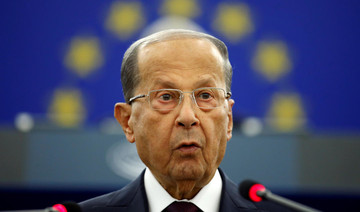BEIRUT: Lebanese Foreign Minister Gebran Bassil responded to what he called Israeli Prime Minister Benjamin Netanyahu’s “allegations” in his speech to the UNGA on Sept. 27 claiming that Hezbollah had missile launchers near Beirut’s Rafic Hariri International Airport.
Bassil gathered foreign ambassadors to Lebanon and representatives of the diplomatic missions and UN organizations in the ministry’s headquarters in Beirut about “false allegations” from the UN forum.
Bassil said that the international community bears the responsibility for “accepting false allegations launched from the UN forum, and this is your responsibility, especially the permanent members in the UNSC.”
The US ambassador, Elizabeth Richard, was absent because she was traveling, but prominent attendees included the ambassadors of Russia, France, Britain, the EU, Saudi Arabia and Kuwait.
However, Arab ambassadors and diplomats missed Bassil’s tour to the area, which Netanyahu said housed Hezbollah’s rocket launchers, in the Ouzai neighborhood, part of Beirut’s southern suburb.
Russian Ambassador Alexander Zasypkin was keen to be present for every part of the tour.
The tour, which was accompanied by journalists and photographers, started from the golf course that Bassil said “Netanyahu raised its (the hangar’s) image in front of the UNGA audience.” Instead of heading to the hangar, the delegation went to the Al-Ahed stadium, which Israel claimed was a missile platform. “The doors are open to see everything, we are a sports club, we played 47 games without a loss,” a stadium official said. “What’s under the stands is changing rooms.”
Bassil insisted on going to these places accompanied by cameras. The stadium official said that it was “financed by FIFA Goal and built by the Jordanian Mondo Construction company.”
The delegation, which decreased in number and was limited to media professionals, went to a hangar near the airport in a residential neighborhood. Bassil stopped in front of it without entering, prompting a journalist from the Daily Star newspaper to request entry into the hangar if “Minister Bassil sticks to transparency.” An attempt was made to open the hanger in the presence of the Lebanese army, and it turned out to be an abandoned factory.
“The realities and facts must be taken, and this is an opportunity for that,” Russian Ambassador Alexander Zasypkin said in a statement from the assembly point at the golf course before the tour began. “The region has been in a state of emergency for years, including between Lebanon and Israel and the triangle of Lebanon, Israel and Syria, and we stand to prevent any escalation,” he said. “As for the future, we will act depending on facts, not assumptions, and we will maintain normalcy.”
Bassil explained the reason for organizing the tour. “The foreign ministry is not a fact-finding committee and we do not operate as an Israeli scout. This is the exact location, the airport area. When Netanyahu spoke about it, we know Israel’s intentions, and because he spoke from the UN forum, we had to emphasize that the airport is an airport for peace, for the reconstruction of Lebanon and Syria and linking Lebanon to the world and the Lebanese diaspora, so we decided not to remain silent and this initiative will not be repeated.”
“Netanyahu is running away from his accusation of corruption to an external issue to throw lies and accusations that do not frighten us, but could cause confrontation, as is happening now,” Bassil told the diplomats.
He also spoke about Israel’s continued violations of international resolutions. “It did not respect Resolution 1701, it violates our airspace, our land and our land. It violated our land, air and marine space 1,417 times in the last eight months, more than 150 times a month, all registered at the Ministry of Defense.”
Bassil said that “Israel is used to exercising fabrications and it exercised this from the UN forum on Sept. 27, with the allegation of the presence of three platforms near the airport. This is not based on information or evidence, and Lebanon is raising its voice now to prevent any attack or Israeli intention to strike Lebanon, which will destabilize the region in light of the presence of Palestinian and Syrians refugees in our country. Lebanon will not be the victim of any settlement in the region.”
“It is illogical to hide rockets near an international airport. It is true that Hezbollah has missiles, but they are not near the airport,” he said.
“We say to Hezbollah, if this is true, I do not think it is in the interest of the airport, its movement and security around it. This cannot happen with Hezbollah’s wisdom and understanding of Lebanon’s interests.”
Bassil said that the response to the Israeli army spokesman, Avichai Adra’i, “will be through the Lebanese army.”
Adra’i had addressed Bassil, before the diplomatic gathering in the Lebanese foreign ministry, saying “What are you going to tell the ambassadors? You are supposed first to stop Hezbollah’s terror and withdraw its arms from Beirut Airport’s area.”
“Did you check well if Hezbollah was still using the sites we have uncovered or is it just a show?”

























